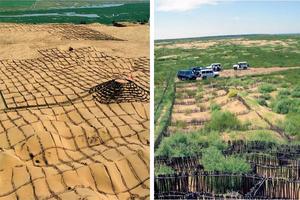 This composite photo shows Kubuqi Desert in the past and the present, spanning 20 years. (PHOTO PROVIDED TO CHINA DAILY)
This composite photo shows Kubuqi Desert in the past and the present, spanning 20 years. (PHOTO PROVIDED TO CHINA DAILY)
The harsh natural condition of his hometown in a barren desert forced poverty-stricken Naranmandakh to emigrate in 2007. About 10 years later, the 51-year old man of Mongolian descent decided to come back, still poor. Since then, however, he has become a millionaire.
Naranmandakh's success may leave many people astonished, but they might be even more astounded to see the change that has occurred to his hometown in the Kubuqi Desert in the Inner Mongolia autonomous region.
People in the area no longer suffer from severe water shortages. Instead, they have even developed an industry that depends heavily on aquatic farming.
For decades, Naranmandakh's family made a living from cow and goat herding. The increasingly scarce water resources near his village of Bayanundur, however, made it hard for him to continue his business.
"I raised 200 goats before I moved away," he recalled.
"As the ecological condition deteriorated, however, some natural wetlands we heavily depended on to get water for the animals shrank. It was increasingly difficult for us to get drinking water."
Naranmandakh, along with 18 other families, moved away to an area closer to the Yellow River with the help of the local government in 2007.
Though the village was suffering from a water shortage, about 31 billion cubic meters of water flow along a river across Hanggin Banner, where the village is located.
The project has helped generate a 20-square-kilometer body of water and create a wetland of 60 square kilometers, according to the local government
Due to the frequent ice jams that block the water flow during winter, however, people near the river in the banner often endured floods, said Liu Haiquan, head of the banner's water resources bureau.
But this is where the local government turned hazards into advantages that have made Naranmandakh a millionaire.
In 2016, Hanggin invested over 40 million yuan (US$5.6 million) to build a 38.5-kilometer channel to direct water from the Yellow River into the Kubuqi during the winter.
READ MORE: Team to examine options for plateau water project
The project has helped generate a 20-square-kilometer body of water and create a wetland of 60 square kilometers, according to the local government.
While greatly reducing the risk of ice jams, "the project has promoted the restoration of the local ecological system and brought marked benefits to people living nearby," Liu said, citing Naranmandakh as an example.
"Because of the water shortage, we were unable to raise many cows. Now that there is plenty of grass and water, the animals can easily find food to fill their stomachs. Cow herding has become a lot easier," Naranmandakh said, adding he plans to increase his cattle to 1,000 from the current 600.
According to Elion Resources Group, which has been promoting sand control in the Kubuqi for over 30 years, the vegetation coverage rate in the desert has increased from less than 3 percent to 53 percent.
It said there have been 20 species of plants growing in the wetland generated by the water diversion project, and the area now serves as a habitat for 10 species of birds.
ALSO READ: Success of water project brings benefits to Beijing
While cow raising has greatly increased the incomes of over 30 households, local people are eying more opportunities brought by the project to lead wealthier lives.
Naranmandakh, for example, has tried aquatic farming and running a rural resort.
He also started to raise crabs in 2018.
Though many of the crabs escaped because of a sudden rise in the water level, he still profited as the price of his crabs reached over 50 yuan per kilogram when he sold them around the Mid-Autumn Festival, a time many Chinese people think is the best to eat crabs, he said.
He plans to farm crayfish while expanding crab raising.
"It should be no big problem for me to make over 1 million yuan a year from raising cows and crabs," he smiled.


